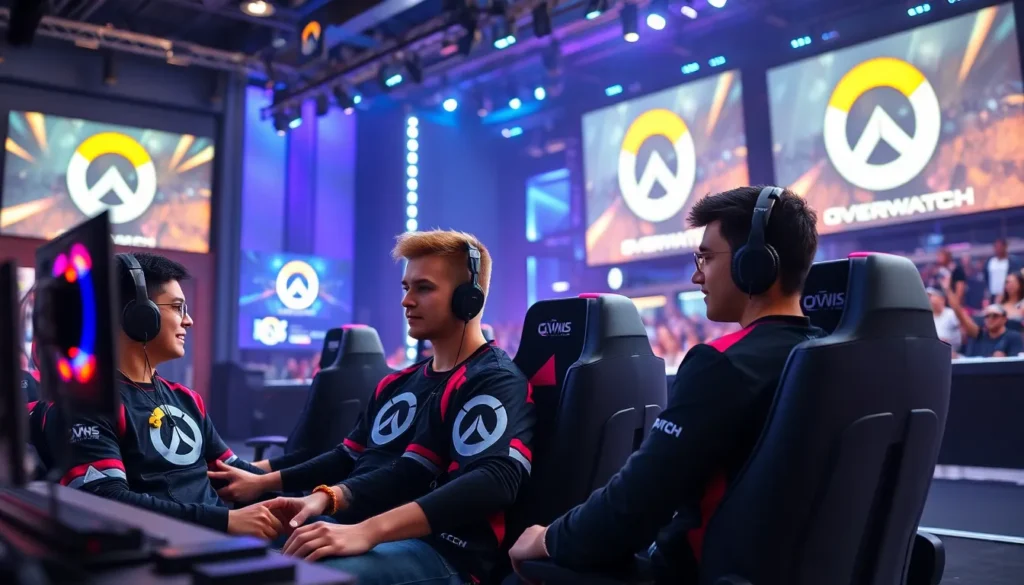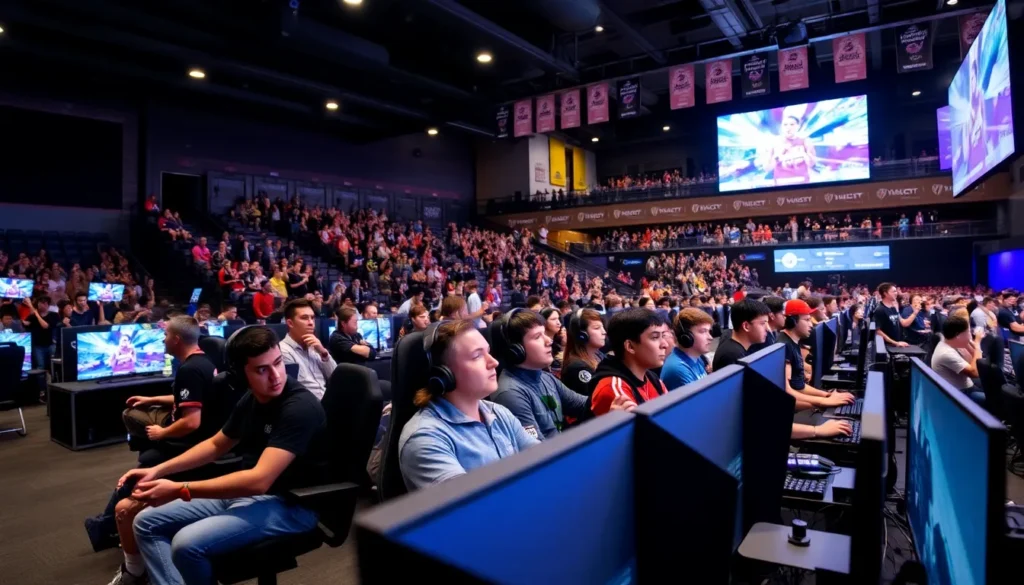Table of Contents
ToggleIn the fast-paced world of esports, every match is a rollercoaster ride of emotions, strategy, and jaw-dropping plays. Fans eagerly await the latest results, hoping their favorite teams will rise to glory or, at least, not trip over their own shoelaces. With tournaments popping up like mushrooms after a rainstorm, keeping track of these results can feel like herding cats—impossible but oh-so-rewarding when done right.
Understanding match results isn’t just for the hardcore fans. Whether you’re a casual viewer or a die-hard enthusiast, knowing who won, who lost, and what it all means can elevate your viewing experience. So grab your snacks and get comfy; it’s time to dive into the thrilling world of esports match results and discover what makes this digital battleground so captivating.
Overview of Esports Match Results
Esports match results capture the essence of competitive gaming, providing insights into team performance and individual skill. Fans analyze these results to gauge trends and statistics, which highlight strengths and weaknesses of teams. Different tournaments showcase various games, with each match contributing uniquely to the overall narrative of the competition.
Tracking results across platforms keeps fans engaged. Live score updates offer real-time access to match outcomes, making every moment crucial. Participants in this industry rely on comprehensive data, enabling informed discussions among the community. Each victory or defeat not only affects rankings but also influences future team strategies.
Match results feature multiple metrics, including kill/death ratios, objective control, and economic advantages. These statistics offer depth, allowing analysts to paint a clearer picture of how matches unfold. Fans often refer to platforms like Liquipedia and ESPN Esports for accurate and up-to-date results.
Understanding match results enhances the viewing experience. Knowledge of past performances informs predictions, intensifying excitement during live broadcasts. Game enthusiasts connect emotionally with their favorite teams, driving the popularity of esports. They thrive on the drama and unpredictability present in each contest.
Notably, specific match outcomes can shift player careers and team dynamics. A single upset can redefine expectations, prompting conversations within fan forums and social media. Engagement from players and fans alike builds a vibrant ecosystem around esports match results, fostering a sense of community within the competitive landscape.
Major Esports Tournaments

Esports tournaments attract global attention, showcasing intense competition and extraordinary talent. Understanding their structure and recent outcomes provides valuable insights into the esports landscape.
Tournament Structure
Tournaments often follow a bracket format, featuring single-elimination or double-elimination stages. Group stages typically precede knockout rounds, allowing teams to compete in round-robin formats for qualification. Fans witness best-of-three or best-of-five matches during playoffs, escalating intensity as teams vie for victory. Major tournaments, such as The International for Dota 2 or the League of Legends World Championship, set the stage for top teams to gain recognition. These tournaments also influence rankings and seedings in future competitions.
Key Takeaways from Recent Events
Recent esports events revealed notable shifts in team dynamics and player performances. For instance, Team Liquid’s victory at ESL One showcased their strategic prowess in Dota 2. In contrast, G2 Esports captured attention in League of Legends by defeating formidable opponents. Fans noted the rise of underdog teams, which adds excitement to the competitive scene. Match results highlighted standout players, such as the impressive performances of s1mple in CS: GO. Analysts also observed trends in gameplay tactics, serving as a focal point for community discussions and analysis.
Analysis of Match Results
Understanding match results serves as a crucial element in the esports landscape. These results reveal vital performance metrics and influence team rankings.
Performance Metrics
Kill/death ratios, objective control, and economy management provide key insights into player performance. Analyzing these metrics enables fans to gauge strengths of teams and areas for improvement. Teams often assess their past performances through these figures to refine strategies. Valuable data can be found on platforms like Liquipedia and ESPN Esports, offering accurate statistics for every match. Players with higher kill/death ratios typically showcase better individual skill during tournaments. Detailed metrics form the foundation for discussions about gameplay strategies within the community.
Impact on Rankings
Match results directly shape team rankings in esports. Winning a significant tournament can drastically elevate a team’s position in the standings. Rankings often reflect consistency, demonstrated through a series of strong performances. Major tournaments like The International and League of Legends World Championship influence the competitive hierarchy as they showcase top talent. Conversely, unexpected losses can lead to a drop in rankings, sparking debates among fans and analysts. Each tournament outcome adds depth to the ongoing narrative of team dynamics, impacting potential sponsorships and future matchups. Understanding these patterns enriches fans’ engagement with the esports scene.
Highlights from Top Teams
Recent match outcomes showcase the remarkable capabilities of top teams in the esports arena. Team Liquid demonstrated their strategic prowess during ESL One, securing key victories that highlighted their adaptability. G2 Esports consistently performed well in League of Legends, showcasing impressive skill and coordination.
Notable underdog teams have also emerged, surprising fans with unexpected wins and exciting matchups. These teams often challenge preconceived notions of competition, making tournaments more unpredictable. Players like s1mple in CS:GO capture the audience’s attention with their exceptional gameplay, pushing team dynamics to new heights.
Key performance metrics reveal significant insights into team strategies and individual performances. Kill/death ratios and objective control statistics provide a deeper understanding of match dynamics. Next, analysts focus on evolving gameplay tactics that shape discussions within the community.
Major tournaments serve as stages for these fierce competitions, drawing global attention and admiration. The International for Dota 2 exemplifies this, featuring elite talent and unprecedented match intensity. League of Legends World Championship enhances team recognition, influencing future rankings significantly.
Match results also impact the esports landscape beyond gameplay. They influence team rankings and potential sponsorship opportunities. Therefore, keeping abreast of these results enriches the fan experience, allowing for informed engagement during discussions and predictions around live broadcasts. Understanding these highlights truly enhances the enjoyment of esports for all enthusiasts.
Fan Engagement and Community Reactions
Fan engagement plays a crucial role in the esports ecosystem. Communities thrive when fans actively participate in discussions about match results and player performances. Social media platforms like Twitter and Reddit become vibrant hubs for real-time reactions and analyses. Gamers express excitement over unexpected victories or disappointment from losses, driving conversations that keep enthusiasts invested.
Community reactions often center around statistics from match results. Kill/death ratios and objective control figures spark debates among fans about individual and team strengths. Analysts reference these metrics to provide deeper insights into competitive dynamics. Fans appreciate when teams adapt their strategies based on performance data from past matches.
Tournaments create opportunities for fans to connect. Major competitions like The International or the League of Legends World Championship generate buzz on various platforms. Viewers eagerly share their predictions and express support for their favorite teams during matches. The thrill of live broadcasts creates a shared experience that strengthens bonds among community members.
Notable players also elicit passionate responses from fans. Players like s1mple attract attention due to their impressive performances in CS:GO, and crowds rally behind underdog teams that achieve surprising results. Highlight reels and match recaps amplify these moments, fostering ongoing discussions about gameplay strategies and potential future matchups.
Understanding match outcomes enriches viewer experience. Fans often analyze results to gauge team trajectories and player development. Engaging in these discussions enhances the overall enjoyment of esports, as fans connect over shared interests, resulting in a more informed and dynamic community. The excitement surrounding match results remains pivotal in shaping the narrative of esports competitions.
Esports match results serve as the heartbeat of the competitive gaming scene. They not only reflect team performance but also ignite discussions among fans and analysts alike. By keeping track of these results, viewers gain deeper insights into gameplay strategies and player dynamics.
As the esports landscape continues to evolve, understanding match outcomes becomes increasingly vital. This knowledge enhances the viewing experience and fosters a strong sense of community among fans. With each tournament bringing new surprises and standout performances, the excitement surrounding esports only grows. Engaging with match results allows fans to fully immerse themselves in this thrilling world, making every moment of competition even more captivating.







